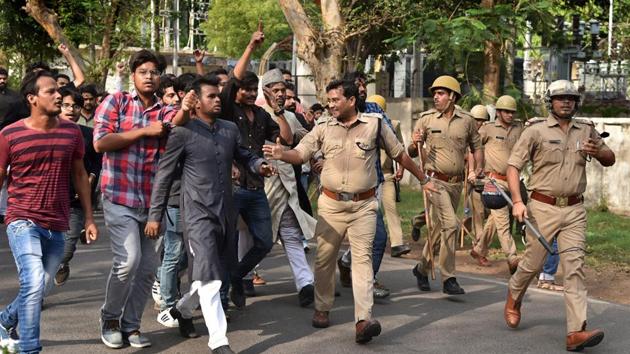Adityanath seeks removal of Jinnah portrait from AMU amid uneasy calm on campus
AMU students union, which held a sit-in protest against Wednesday’s police action, says Jinnah’s portrait will remain on campus
An uneasy calm prevailed over the Aligarh Muslim University campus on Thursday even as Uttar Pradesh chief minister Yogi Adityanath joined the growing calls for the removal of Mohammad Ali Jinnah’s portrait, protests over which had led to violent clashes the day before.

Students, angry over Wednesday’s police action, staged a day-long sit-in at the campus gate. The portrait of Pakistan’s founder at the student’s union hall was briefly taken off, apparently for cleaning, and was put up again on Thursday by AMU students.
Some minor skirmishes between students and police were reported later in the evening. The police alleged students pelted stones at them. “The situation is under control,” a police officer said even as agitating students refused to heed the growing demands from the ruling Bharatiya Janata Party (BJP) for the removal of the portrait.
“No way, sir... The portrait will remain there. Whatever it is, you can’t erase history and Jinnah is part of the history of undivided India,” said Mashkoor Ahmad Usmani, the AMU Student’s Union president.
Chief minister Adityanath, campaigning for BJP in Karnataka, sided with the growing chorus within the BJP against the Jinnah portrait on the AMU campus. An aide said an angry chief minister had sought a report from the local administration on Wednesday’s developments.
“I think the glorification of Jinnah is unfortunate. My government would act strictly against all those who were behind the trouble (on Wednesday),” he said at an election rally.
Taking a cue, the Hindu Yuva Vahini, an outfit founded by Adityanath, demanded an FIR be registered against those who had put up the portrait on at AMU. “In fact, the portrait needs to be replaced with that of Baba Ambedkar,” said Raghvendra Singh, state in-charge of HYV.
AMU students, meanwhile, accused senior police officers of taking orders from the Rashtriya Swayamsevak Sangh (RSS) and BJP leadership. They accused BJP of fuelling discontent on campus. Students raised slogans against the Hindu Jagran Manch, blaming it for provoking varsity students, leading to “one sided” police action.
AMUSU secretary Mohammed Fahad who was injured in Wednesday’s clash with the police, demanded that the National Security Act be invoked against BJP’s Aligarh member of Parliament Satish Gautam, who initially demanded the removal of the portrait.
“It was he who stoked the fire,” Fahad, who is recovering in hospital, said. He said a delegation of students would approach the police seeking FIR against BJP leaders, including the local MP, as well as members of right wing groups who had burnt Jinnah’s effigy on campus.
Jinnah’s portrait installed at the AMU students union hall since 1938 became the focus of the controversy after Gautam on Tuesday wrote to AMU vice chancellor Tariq Mansoor seeking justification for the portrait of a leader whom the RSS held chiefly responsible for the partition of India.
“I stand by my demand to remove the portrait,” said Gautam. Other BJP leaders have now joined in.
“There is no justification for the portrait and it must be removed forthwith,” said BJP MP Jagdambika Pal. Deputy chief minister Keshav Prasad Maurya said Jinnah’s portrait anywhere in India was unfortunate. “I fail to understand what relevance Jinnah has in present day India. He is a traitor and his name shouldn’t be taken in present day India,” Maurya said.
UP minister Om Prakash Rajbhar, the chief of the Suheldev Bharatiya Samaj Party, a BJP ally, too demanded that the portrait be removed.
Congress leader Ashok Singh took potshots at the BJP on the issue. “Why was this issue allowed to snowball? Whose government is it in UP? Moreover, what has the party got to say on its leaders who had visited Jinnah’s mazaar (grave) and some who had written a book( on Jinnah),” Singh said in a reference to BJP’s patron LK Advani, who had angered the RSS by visiting Jinnah’s grave in Pakistan and later praising him, and BJP leader Jaswant Singh, who wrote a book on Jinnah.






